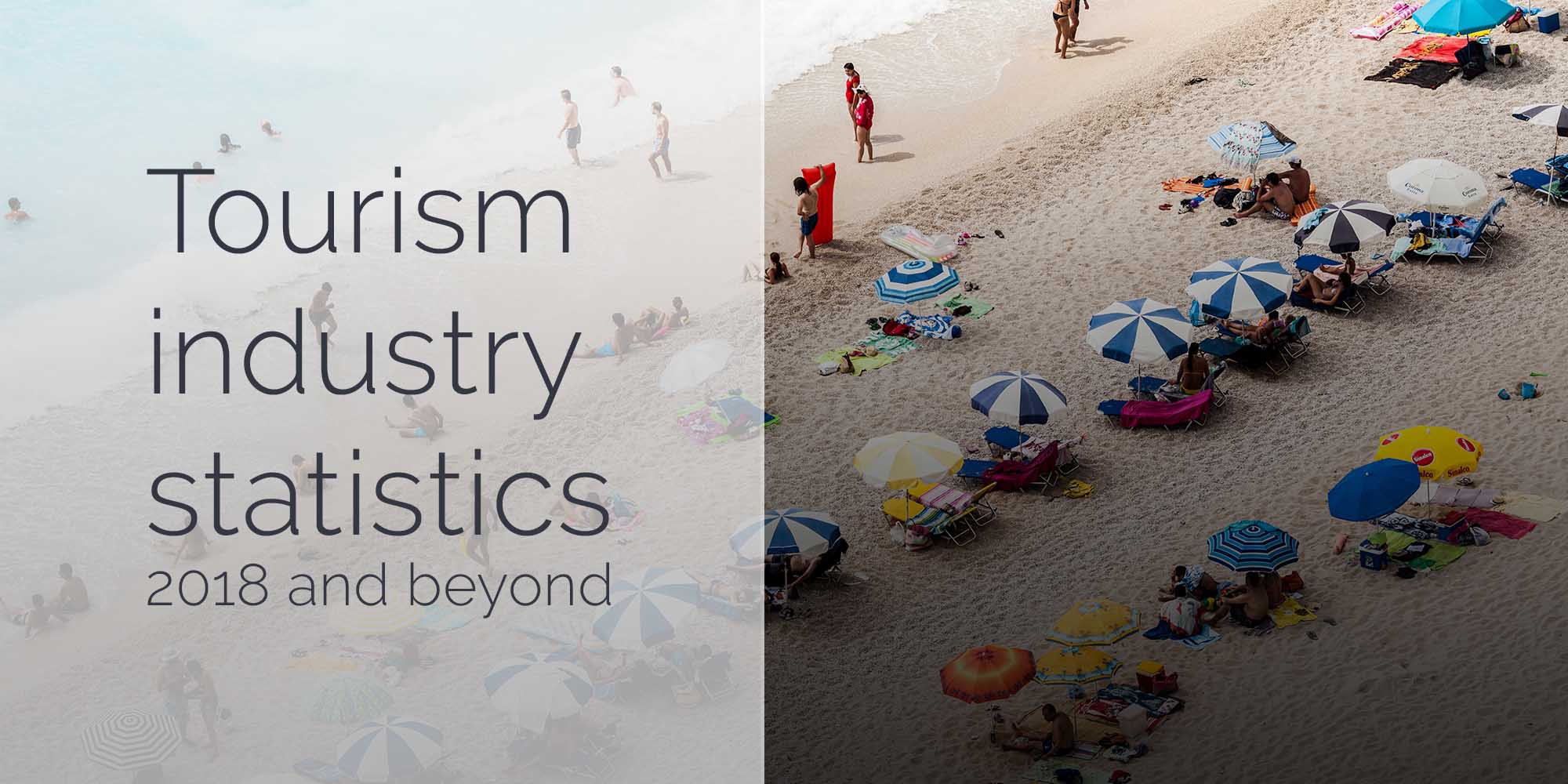Tourism industry statistics for 2018 and beyond

2018 Travel Industry Statistics
We live in a fast-paced, instantaneous world. Mega industries like tourism are continually evolving and that means it can be difficult to keep abreast of changes, trends, and growth. This blog aims to make exploring the depths of tourism a little easier; we’ve compiled some of the most up to date statistics from sources across the globe and broken them down into a few key areas.
 Sector growth: Understand the key drivers behind tourism’s growth in 2018 along with where the biggest growth factors are happening at the moment.
Sector growth: Understand the key drivers behind tourism’s growth in 2018 along with where the biggest growth factors are happening at the moment.
 Emerging trends and markets: The title speaks for itself. This section explores the up and coming markets and trends that you should be paying attention to as we prepare to move into 2019.
Emerging trends and markets: The title speaks for itself. This section explores the up and coming markets and trends that you should be paying attention to as we prepare to move into 2019.
 Challenges to tourism: From climate change to strategic business ventures – there are a lot of forces influencing tourism. Here we break down a few key threats and challenges that tourism operators and DMC’s will need to be aware of.
Challenges to tourism: From climate change to strategic business ventures – there are a lot of forces influencing tourism. Here we break down a few key threats and challenges that tourism operators and DMC’s will need to be aware of.
 Technology in travel: Being in the tour operator software space, this category is particularly close to our hearts. Understand the up and coming innovations and trends and how they will affect your tour operator business in years to come.
Technology in travel: Being in the tour operator software space, this category is particularly close to our hearts. Understand the up and coming innovations and trends and how they will affect your tour operator business in years to come.
 Luxury travel: With personalisation and customisation being popular trends running throughout 2018 tourism reports, it’s no wonder that this has resulted in the luxury segment of the market expanding significantly.
Luxury travel: With personalisation and customisation being popular trends running throughout 2018 tourism reports, it’s no wonder that this has resulted in the luxury segment of the market expanding significantly.
- Tourism is still one of the world’s fastest growing sectors with bookings in 2017 reaching almost $1.6 trillion. (Deloitte, 2018)
- Tripadvisor is still one of the industries most heavily relied on source for travel information with over 324 million monthly visitors recorded in 2017 (Salecycle, 2017)
- What’s bigger than Tripadvisor? Booking.com, which is now the most popular travel site in the world with more than 443 million visitors recorded in May 2018. (Salecycle, 2018)
- Travel and tourism in 2017 contributed 10.4% to global GDP (gross domestic product). That’s 4.6% more than the previous year (World Travel & Tourism Council, 2018)
- Globally, almost 10% of all jobs are linked to the travel and tourism industry. (World Travel & Tourism Council, 2018)
- In 2017, US $882.4 billion was invested in Tourism. That is forecasted to rise by 4.8% this year, and continue to rise by 4.3% year on year, making total investment US$1,408.3 billion by 2028. (World Travel & Tourism Council, 2018)
- International tourist arrivals worldwide grew by 6% in the first 6 months of 2018 compared to the same period in 2017. (World Tourism Organization, 2018)
- Consumer confidence is on the rise in America, and travel trends are rising in accordance with it. In 2018, 5% more people travelled 50 miles or more during the 4th of July holiday period. (Travel + Leisure, 2018)
- Intense competition between airlines is resulting in a price war. Travellers are coming out better off with cheaper airfare and more accessible travel. (Deloitte, 2017)
- Solo travel is surging and over 40% of those travellers are Baby Boomers. (Hospitality.net, 2018)
- Solo travellers like to travel frequently, with 43% of self-proclaimed solo travellers going on 3 or more trips per year. (Solo Traveller, 2018)
- The cruise industry has become the fastest growing tourism industry, increasing at a rate double that of any other land-based tourism sector. (Journal of Cleaner Production, 2017)
- 70% of cruise bookings are made through travel agents. (World Cruise Industry Review, 2015)
- Travellers are growing increasingly conscious of the impact they have on the environment. As a result, 54% of all travellers answered that they were ‘quite likely’ to book their vacation with a tour operator that specialised in sustainable travel. 19% were very likely. (Statista, 2017)
- 57% of international tourists in 2030 will be travelling to emerging economies. (Responsible travel, 2017)
- Millennials are 13% more likely to travel to a destination with cultural or historical significance. (Responsible travel, 2017)
- Over the past decade, Turkey, Egypt, and Tunisia all experienced an extreme downturn in visitors. The lack of tourism appeal for these 3 countries is mostly attributed to war and terrorism concerns. In 2018, however, it appears European travellers are making the move back into these nations and are opting to spend summer breaks here compared to the ever popular Mediterranean. (Swift, 2018)
- The average consumer is changing their spending habits, and travel is benefiting as a result. General spending on tangible goods is dropping, whereas spending on experiences such as travel and eating out is on the rise. (Deloitte, 2017)
- Extreme weather events are becoming more frequent and are damaging destinations beyond repair. If no action is made, climate change is expected to increase sea levels and flood low lying coastal destinations, islands, and natural attractions such as the Great Barrier Reef. (Swift, 2018)
- Chinese tech companies such as Alipay and CTrip have a stronghold in the Chinese domestic market, meaning there has been very little incentive for the tech giants to take their software offshore. The lack of availability offshore is resulting in millions of Chinese travellers to opt for domestic travel instead of international. (Swift, 2018)
- The impact that Brexit will have on tourism in the UK and Europe is still uncertain. 2018 is the last year that the UK will be a member of the European Union, the departure is set for March 2019. (Visit Britain, 2018)
- Social media now has more influence over traveller decision making than ever before. In fact, more than 50% of travellers from the US, UK, Canada, and Australia said that content, promotions and deals on social media influences their travel plans. (Expedia, 2018)
- Travel brands are adapting their marketing strategies in line with traveller behaviour, reporting that on average, 61% of their marketing budget is now spent on digital advertising. (Phocuswire, 2018)
- 55% of travellers will like at least 1 Facebook page relating to a trip they are planning. 52% of travellers also said that friends travel pictures inspired them to travel. (WebpageFX, 2018)
- 83% of Millennial travellers have said they would be happy for travel brands to track their digital patterns if it meant they would receive a more personalised travel experience. (MDG advertising, 2017)
- Mobiles are prevalent, however, travellers still prefer to research their journeys with a desktop, with 76% of travellers saying they use their desktop to research accommodation. (Social media today, 2018)

- An increase in middle and upper-class spending, paired with a growing inclination for exotic travel has caused the demand for luxury travel to explode. Currently, luxury travel is expected to continue to grow at a rate of 6.4% per year. (Allied Market research)
- Americans with an annual income of more than US$100,000 make up 20% of the total population, however, that same 20% make up more than half of all US travel spending. (Skift, 2018)
- High-end travellers from Asia are changing the landscape of luxury travel in 2018. With new heights of exclusivity and lavishness expected from these travellers, some travel brands are opting to restructure in order to offer a new tier of extreme luxury while also continuing to cater to the western luxury market. (Swift, 2018)
As far as industries go, Tourism is well and truly up there with the other industry giants and the stats certainly back that up. In years to come, we can expect continued growth, increased uptake of technology by businesses and travellers together with the emergence of some very interesting trends such as solo travel and sustainable travel. But it’s not all good news…there are significant challenges on the horizon. Global warming, political changes and mega-corporations all have the power to impact tourism, no matter where in the world you are based.




